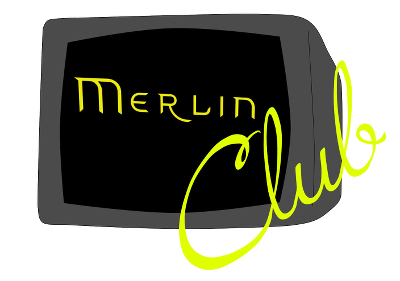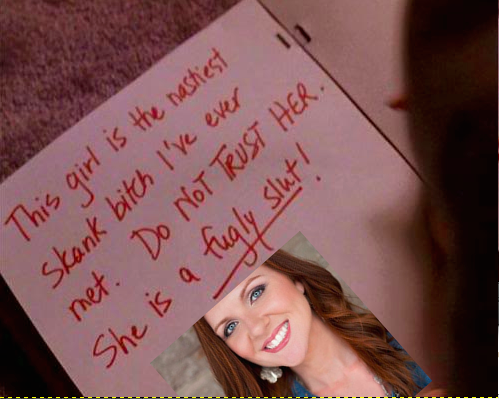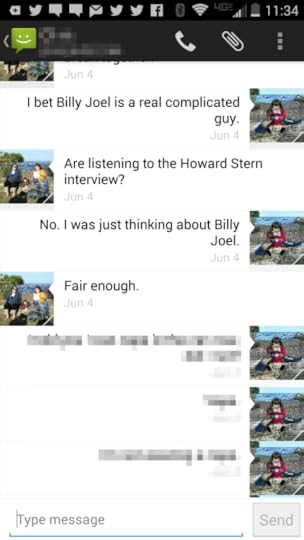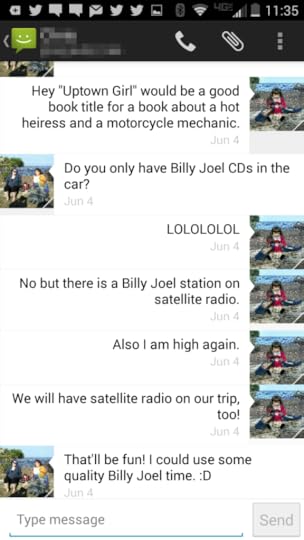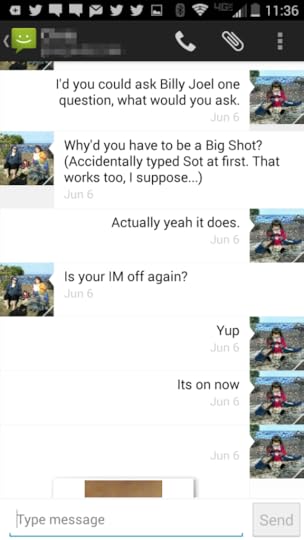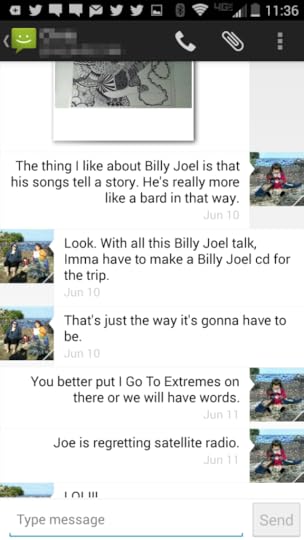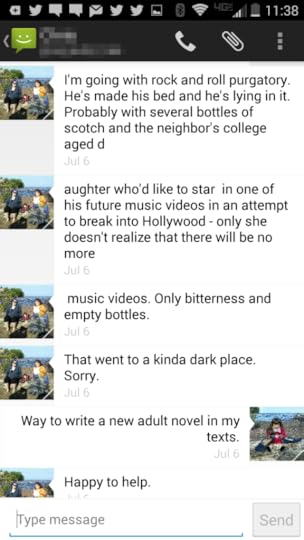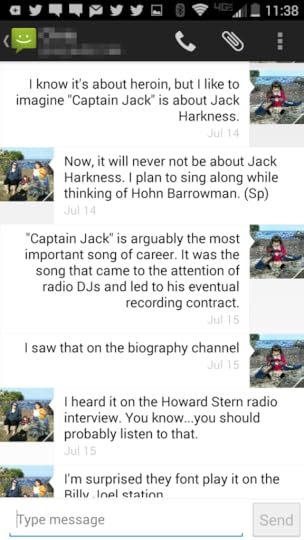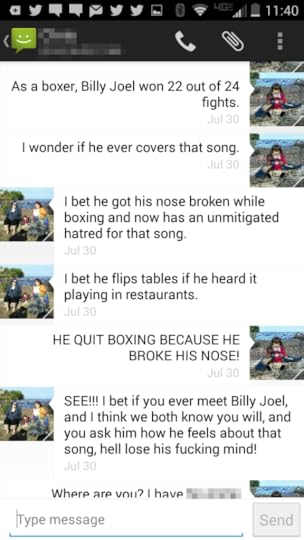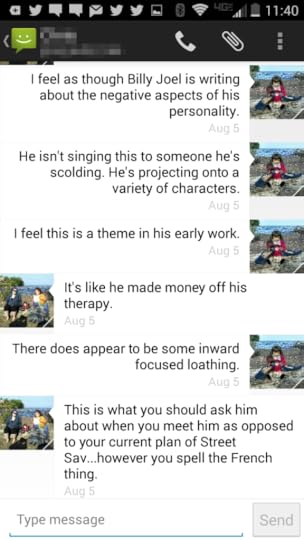Abigail Barnette's Blog, page 96
October 6, 2014
BIG DAMN SELF-PROMO POST!
Okay, everybody! If you count time the way I do, we just did one of these “the other day” (keep in mind, I recently said that the Challenger disaster was “the other day”). But in real people time, it’s been a while. Use the comments section to promote your indie projects. Your bands, your blogs, your movies, your books, your Kickstarters, your Etsy shops, anything that you produce independently and want to share with Trout Nation, post it in the comments. Give us a few sentences or paragraphs so we know what we’re looking at it (no links just left out there in the raw, please) and promote all your projects in one comment.
Don’t have an indie project to share? Browse through the comments. You’ll find some amazing stuff, because Trout Nation is full of interesting and creative people.
Since I promote my own projects all the time, this time I’m going to promote an indie band, Overly Polite Tornadoes:
Mark Morris and Holly Klutts-Morris are already in another awesome indie band, Glowfriends (You may have heard their music on MTV’s Teen Wolf ), and they also happen to be my cousin and her husband, so I think they’re pretty darn neat. You can download their album for $5 at the link above, and it’ll be worth every penny if you’re into introspective, chill music.
All right, everybody, GO!
October 5, 2014
“Feeling” fat vs. actually being fat
After receiving violent threats and a stream of near constant abuse for weeks after my interview on NPR, I had promised myself that I would never, ever, ever blog about “All About That Bass” again. My interactions with fans of the song have been so overwhelmingly negative, to the point of having to contact law enforcement, that I can’t even stand to hear a few notes of it as I scroll on past on the car radio.
However, when someone has a dissenting opinion, and it’s presented reasonably and without threatening myself, my family, or my pets (Yes, even my pets deserved to die painfully because I didn’t care for a song), then I’ve got no problem hearing it. So, when a blogger wrote her own post about why she disagreed with me, I read it.
Warning: Before you go any further, I feel obliged to warn you that if you’re a woman size six to size fourteen, there’s a high likelihood that you will feel that I am unfairly excluding women of your size from the body positivity or fat acceptance movements, or singling you out, personally. If this post makes you feel that way, before you get too angry, I’d like you imagine what it feels like to have that happen in every conversation about body positivity that you’ve ever been involved with. And if that doesn’t work, just think of the last time someone asked you for a favor, despite never doing one for you. That will help you understand my point of view and the frustration I feel a little bit better.
I’m hesitant to link the post here; I know that my regulars are awesome people, but I get a lot of hits these days, and I can’t possibly vouch for everyone. Since I don’t know if someone out there is going to rage and attack her the same way I was attacked for my original posts, I’m on the fence. So, I’ll just excerpt the part I really want to talk about:
“My first criticism of this post is of the quote “This girl is not a fat girl. This whole concept of not-fat women believing they need to call attention to their not-fat bodies in order to promote body acceptance baffles me.” Firstly, I agree, she is not a fat girl. As far as the media is concerned, however, she would be considered plus size. A plus size model is often defined as anyone over a size 8, and sometimes even over a size 6. While not fat, Meghan Trainor is clearly more than a size 8, and I would bet just about anything that in the comments of her video many people have called her fat. And just because we do not consider someone else to be fat, does not mean that they don’t feel fat. Our opinions do not control other people’s feelings, and it is incredibly self righteous of you to believe that your opinion that Meghan Trainor is not fat would make any difference to how she feels. Moving on…”
On my original post, someone stated in the comments, “Fat is not a feeling.” That struck such a deep chord with me. For years, body positivity or fat acceptance seemed to be centered around making women who “felt” fat recognize that they were more beautiful than their thin counterparts. All this did was create a new standard of beauty in a particular category. Plus-sized models are often “all the right junk/in all the right places” models; their stomachs have some jiggle, but are mostly flat, their waists are nipped in, and their heads could have been transplanted from any industry standard-sized model, with well-defined cheekbones and not even a hint of double chin:
Remember when these women would have just been “models,” and not “plus-sized” models? It was called the 1990′s:
This is what “plus-size” has become. Cindy-Crawford-in-a-Pepsi-commercial bodies have become what we identify as “fat,” and it’s brainwashing women who aren’t fat into believing that they are.
Is that horrible? Yes. Should we be combating this image of the size 6 – 10 “plus-size”? Absolutely. The blogger has a point about the media making women feel like they’re fat. Just compare those photos again. And yes, if a woman is told that her perfectly fine body is “plus-sized,” she’s going to take a self-esteem hit for no reason, since we’ve all been told that “plus-sized” equals fat (when in reality, plus-size is merely a merchandising conceit). She’s going to “feel” fat. And that’s supposed to be our main concern: reassuring women larger than a size four, but smaller than a size twenty, that she isn’t a fat person.
But some of us don’t “feel” fat. Some of us are fat. We don’t have “all the right junk/in all the right places.” We have junk that magazines tell us they don’t want, as well. But our “junk” isn’t the stuff celebrated in songs written specifically to make us feel good. Where’s the anthem to the double chin? Where’s the song about back rolls, or fat aprons? Cellulite? Bingo wings? The message the media conveys to average-sized women is that they can be “fat” and still beautiful and valued, so long as they’re only “fat” in culturally accepted ways. But what do women who aren’t “fat,” but are actually fat, get out of this? More body shame, not for being fat, but for not being a thin-enough fat woman with an attractive hip-to-waist ratio, and plenty of derision from those mid-sized women who feel under attack any time discussion of body image turns to criticism of the things that make them feel good.
We’re so concerned with protecting the women who “feel” fat that we steamroll right over women who actually are fat. So many comments I received on my original “All About That Bass” post insisted that the song wasn’t for or about people like me, and that the lyrics absolutely are body-positive because they help women feel better about their bodies. Better how? By insisting, “Don’t worry, you’re not fat.”
As a fat woman, I want to know why I should celebrate a song–or at least, why I should “stop looking to be different by choosing to be offended” by it, as the blogger suggests–because it reassures women by telling them that they don’t look like me? That they don’t look like women who are larger than me? “Don’t worry. You might ‘feel’ fat, but you’re definitely not, so you’re beautiful.”
As the blogger points out, the media does celebrate women who are slender. But the tide has started to turn. Runway shows are banning size zero models–the group that seems to take most of the heat for making women “feel” fat–from their catwalks. “Curvy” women like Christina Hendricks, Kate Upton, and Beyoncé are being held up as a standard of beauty, and a number of songs recently praised the rear-facing assets of women who don’t wear a size two. The persecution of average-sized women in the media is reversing; the stigma of actual fatness is not.
While average-sized women are concerned with not “feeling” fat, fat women are facing challenges that affect their lives far beyond damage to their self-perception. Plus-size clothing stores Lane Bryant and Torrid only sell clothing up to a size 28, at prices prohibitively expensive for low-income women. Buying clothing in a physical store is, if not impossible, then highly unlikely, for women who exceed the “plus-size” category.
Our health is at risk, too, and not just from the obesity-related illnesses we’re warned about; we’re faced with bias from the medical community that puts our health, and potentially our lives, at risk. Obese people face rising weight-based discrimination in the workplace, women especially:
“10 percent of overweight women reported weight discrimination, 20 percent of obese women reported weight discrimination and 45 percent of very obese women reported weight discrimination.”
I’m sure that to some, it seems like I’m blowing things out of proportion. Only one state in the US (Michigan) has a law against weigh-based discrimination. But surely, forty-nine states offering no legal protection for obese people facing discrimination is far lower on the importance ladder than making a woman who doesn’t like the look of her average-sized body feel sexually attractive? Those who face that discrimination–which is perpetuated by the continued celebration of the “right” types of bodies–shouldn’t be told to sit quietly and support those who “feel” fat while their shapes are currently being glorified.
Do I want average-sized women to feel badly about themselves, just because they aren’t 250 lb. or larger? No, of course not. I want all women to feel good about themselves. But we should no longer tolerate women who “feel” fat to be at the center of the body politics conversation. We should no longer allow a woman’s “feeling” of being fat to be placed ahead of the reality of being fat. We cannot “get over” our feeling of marginalization or ignore the cultural attitudes that perpetuate it, just so a woman who will never face that same size-based discrimination can feel beautiful.
Yes, we’re all women, and we should all stick together, but some of us are no longer content to offer support that requires us to “get over” the perpetuation of attitudes that contribute to discrimination against us. Especially not when we’re asked to “celebrate” at a party no one has any intention of inviting us to.
October 3, 2014
Merlin Club S03E09, “Love in The Time of Dragons” or “Man Cat Baby”
Merlin club is a weekly feature in which Jessica Jarman, Bronwyn Green, and myself gather at 8pm EST to watch an episode of the amazing BBC series Merlin, starring Colin Morgan and literally nobody else I care about except Colin Morgan.
Okay, I lie. A lot of other really cool people are in it, too.
Anyway, we watch the show, we tweet to the hashtag #MerlinClub, and on Fridays we share our thoughts about the episode we watched earlier in the week.
So, here’s a quick rundown of episode nine: Gaius’s ex-girlfriend comes back to town with all sorts of potions and charms to make the locals well. Uther, ever inconvenienced by the continued survival of the peasant class, demands an investigation. Even though Gaius knows his ex is using magic, he covers for her. The thing is, Ex is possessed by/is in a partnership with a man cat baby she keeps locked in a box, and they’re both like, “Hey, let’s kill Uther.” So Merlin tries to stop that from happening (for some reason), ex-witch is condemned to death, Gaius rescues her, and Jenny goes home happy because Anthony Head wore a poet-shirt looking thing you can see his chest hair above the collar of.
If I had written this episode, I would have changed: The man cat baby. At this point in the series I start to get tired of the monster-of-the-week episodes. I just want to see the main story arc play out. Also, this episode didn’t seem to have much of a B story. It seems like in one-off episodes where monsters or sorcery comes to Camelot, either too much is going on, or not enough is going on. There’s never a happy middle.
The thing I loved most about this episode: At the end, Gaius could ride off into the sunset with his witch girlfriend, but he chooses to stay behind and stay with Merlin. Granted, I sometimes feel that Gaius is a destructive force giving terrible advice, but he cares about Merlin enough that he’s willing to sacrifice what’s probably his last chance at romantic happiness.
The thing I hated most about this episode: Where the hell were Gwen and Morgana? Off writing slash fic about themselves?
Oh, and also:
THIS SHIT IS NOT OKAY. It’s like fucking Dobby from Harry Potter mixed with the dinosaur that killed Newman in Jurassic Park.
Something I never noticed before: Nothing jumped out at me in this one.
Favorite Costume: This shirt. God bless this open-necked shirt:
Here is proof of some random headcanon I created: I got nuthin’.
What object would Bronwyn steal from this episode?
She’ll put it in the living room, with the others.
What Merthur moment did Jess have the naughtiest thoughts about? I’m undecided. The few interactions they have in this are pretty antagonistic. I don’t feel that they were in character enough to have a Merthur moment. But I’m sure Jess will correct me on that.
Check out Jessica Jarman’s take on the episode here
Check out Bronwyn Green’s take on the episode here
October 1, 2014
Wednesday Blogging: Favorite Songs. You guys probably know what to expect right now.
This week’s Wednesday Blogging is all about our favorite songs. If you don’t know where this is going, then you haven’t been paying attention lately. I talked before about how deeply Billy Joel’s “The Entertainer” has influenced my life, so it should be no surprise that all my favorite songs today are his:
• “Vienna” If you look it up, you’ll learn that Billy Joel was inspired by the sight of a very old woman sweeping the street in Vienna. Her usefulness in old age apparently became a meditation on the longevity and the speed of life. This song helps me so much in my day to day. Last Thursday, I was stressing about getting stuff done. I know so many of you are waiting on The Ex, and recaps, and there are posts to write and emails to answer, and I started to feel overwhelmed. I was listening to “Vienna” and the line “Slow down, you’re doing fine,” jumped out at me so hard, I scheduled an entire weekend off for myself. I’m doing fine. I can’t be everything I want to be before my time, and neither can you. So just slow down and be good to yourself.
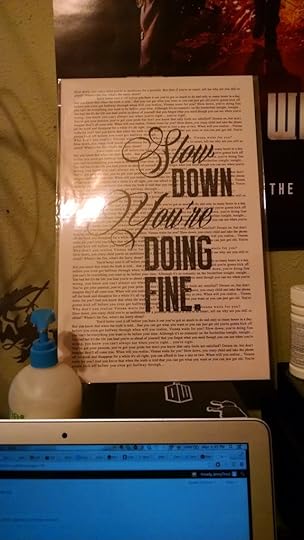
Print purchased from LeMonkeyHouse
• “I Go To Extremes” This song is my mental illness anthem. When I’m up, I’m up, but who the hell knows how long I’ll be up? And my lows are so extremely low, “Sometimes I’m tired, sometimes I’m shot/Sometimes I don’t know how much more I’ve got.” Hearing Billy Joel say those words and knowing that he’s still around despite hitting those lows, I know that I can go on through them and make it to the other side.
• “Allentown” No deeper meaning (yet). I just like the song. HEEEEEEEEEYAAAAAAYYYYYYAAAAAAAAY OH WHOA OH TSH OOH AH
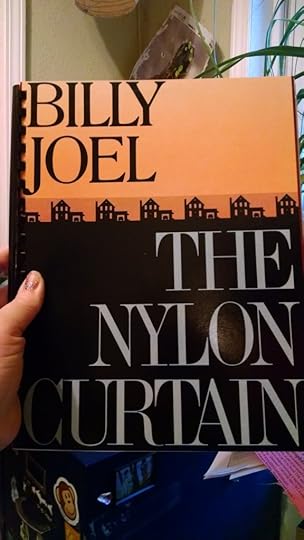
Upcycled album cover notebook by It’s Our Earth Inc.
• “My Life” I wish I would have had this spiritual awakening a few years ago, when I started reinventing myself, because this sums up my entire attitude now. Think I’m being unprofessional about stuff? “Keep it to yourself/it’s my life.” Wanna advise me about my weight and my health? “I don’t need you to worry for me, ’cause I’m all right.” Think you need to abusively argue with me about something on social media? “You can speak your mind/but not on my time.” If you’re out there trying to embrace yourself and be your most authentic you, do it, and remember the words of the prophet:
• “Tomorrow is Today” This is by far the most important of his songs, to me. In 1970, Billy Joel tried to commit suicide. Let that sink in. That was the year before his first solo album, Cold Spring Harbor, which this song is featured on. And the lyrics to this song were adapted from his suicide note. As a person who can profoundly identify with the suicidal feelings expressed in the song, I am so grateful that he shared this experience. It’s strange, but sometimes fixating on things that aren’t, “Oh, how would your family feel?” and “You’re being so selfish,” works better to talk you out of suicidal thoughts, and this is the thing I’ve decided to fixate on if I feel those thoughts creeping in. If Billy Joel had killed himself in 1970, think of what the world would have lost. Now, I’m not saying I’m as talented and profound as Billy Joel, or my death would deprive the world of a similar cultural impact, but it would definitely deprive me of the chance to see what happens next. For Billy Joel, he would have missed out on a pretty amazing life, but in 1970, everything he has now was inconceivable in the midst of a suicidal depression. The existence of this song reminds me that if I cash in now, I won’t get to see what crazy places my life might go.
• “Famous Last Words” It’s not hard to tell what this song is about. It’s the last song on his last studio album. He’s bidding goodbye to songwriting, after watching years go by as his creative process birthed album after album. And he’s giving himself permission to say goodbye. You’d think this would make me sad. It doesn’t. It’s certainly bittersweet; this song is the finale to an epic catalogue of deeply personal songs written by a beautifully flawed human being. But that doesn’t make it sad. It makes everything complete. If those are truly the last words he has to say, that means we’ll never get a disappointing, rushed album that he isn’t fully into giving us. He sealed his legacy with that song, so he’ll never fade into the same mediocrity as so many of his contemporaries have. That’s pretty much any creative person can hope for, right?
Check out what the other Wednesday Bloggers are listening to:
Bronwyn Green • Jessica Jarman • Kayleigh Jones • Gwendolyn Cease • Kellie St. James
September 30, 2014
Newsletter Bug!
Hey everybody! I’m aware of the super awful bug with the newsletter (and thank you to the people who noticed and alerted me), but I would really appreciate if you wouldn’t post exactly what is going on with it in the comments on the blog. It should be fixed by now, but I’ve deleted some comments so as not to call attention to the problem and encourage mischief from badly behaved parties, just in case. Don’t take it personally if your comment got trashed, I just did it so, you know. People weren’t like, “Well, in that case, allow me to sign up and harass the shit out of Jenny in yet another venue!”
Anyway, it’s fixed now, thanks to all of you who let me know what was going on, hope you understand if your comment got trashed, and here’s a picture of a duck:
September 29, 2014
State of The Trout: I forgot the headline at first.
Hey everybody! Just a quick update to share some stuff.
I’m on Ello! If you’re already signed up for the new social network Ello, you can make friends with me or put me under noise there. @JennyTrout
Deirdre Saoirse Moen has created an “Ellora’s Cave Author Exodus Support Thread” If you’re an EC author or editor, you can get some more info here, and share what’s going on with you.
Three 2015 dates have been added to the Meet Me page! There will be more to come, but these are the key three for 2015.
There’s a newsletter now! People have been asking for a newsletter for a long time, and now it’s here. It will be a monthly/bimonthly update with release dates for both Jenny Trout and Abigail Barnette, news, etc. It won’t clutter up your inbox and it won’t be too long. Sign up under the Newsletter tab in the linky bar up top.
Welcome Tez Miller to the blog! She’s coming on board to help moderate comments. Tez’s services as a virtual assistant are available through her website.
I’m going to see Tony Bennett in concert! This doesn’t affect you at all. I’m just really excited about it. Also, I bought the tickets at the casino box office last night, then immediately turned around and won the price back on the first slot machine I played.
Depression is happening. I woke up this morning with the blahs. If I’m scarce, that’s why. Thanks for your continued patience as I fight through my crazy. Right now, it’s not inhibiting my work too much. I’m just kind of… blah. No emotions. For example, I know I’m excited about the Tony Bennett concert, but I don’t feel excited. Ah, brain chemistry. You magnificent bastard.
I shipped UPS from my house like a god damn gladiator. Again, doesn’t affect you, but I’ve never done it before.
September 27, 2014
DON’T DO THIS EVER (an advice column for writers): “On Wednesdays, we wear pink” edition
You guys know that I have absolutely no love for anti-blogger authors who treat the entire publishing world like their own personal version of high school, right? So just wipe out everything in that sentence after “for” and replace it with, “Jamie McGuire.”
Jamie McGuire. How do I even begin to explain Jamie McGuire?
Jamie McGuire is a #1 New York Times Bestseller of contemporary romance. Or YA, if that’s the award she’s trying to win. She believes that if you don’t like her books, you’ve never lived a hard life. And that reviewers should focus only on the parts of a book they enjoyed, and that negative reviews attack the readers who enjoyed the book. (Screencaps from CuddleBuggery.com) She writes books that sound even more horrifying than 50 Shades of Grey. She’s also been known to whip her devoted readers into a frenzy to attack people who have criticized her, and it truly doesn’t seem to matter how many or how few followers these reviewers and bloggers have on social media. You got 300,000 readers? McGuire will go after you. You got 30? She’ll still be at your door.
It’s no secret in the romance publishing world that McGuire and Jane Litte from Dear Author are never going to sit at the same lunch table. McGuire has accused Litte of being an opportunistic stalker, and Litte appears to get a kick out of poking McGuire. You get those stories from the links further up. So when news broke this week that publisher Ellora’s Cave was suing Litte and Dear Author, readers saw through one of McGuire’s tweets:
In fact, she was so happy about the law suit, she tweeted again, hours later:
and again:
It turns out that her shade was about as obvious as a backfiring glitter canon, because everyone on twitter knew what she was talking about. The Mean Girls vibe continued on Facebook, where she and author Theresa Mummert celebrated with macros:

“feeling amused”
So, they’re childishly celebrating the misfortune of their enemies. No harm there, right?
Well… not really. Litte is being sued over her post, “The Curious Case of Ellora’s Cave,” in which Litte writes that while a number of authors and editors have not been paid (some for as long as six months), the company owner has publicly bragged of shopping sprees and started up several side ventures, and that while the company posted $15 million in revenues last year, tax liens and salaries are going unpaid. Ellora’s Cave responded to these concerns by slapping Litte with a lawsuit. Litte stands by the allegations made in her post on behalf of her anonymous sources.
McGuire’s tweet opened a floodgate of responses from authors, readers, and bloggers who immediately knew exactly what she and Mummert were talking about:
If Noted Bully Jamie McGuire has achieved anything here, it’s to simply remind us that she’s not worth our time, money or respect. — Bibliodaze.com (@Bibliodaze) September 27, 2014
Dear Author is an institution, one that’s done more to support readers, writers & romance community than Noted Bully Jamie McGuire ever has.
— Bibliodaze.com (@Bibliodaze) September 27, 2014
@MsAshleighPaige @endless_run @Jenny_Trout If I were Jamie McGuire I would not be so quick to get excited about the idea of karma. — Ros Clarke (@ros_clarke) September 27, 2014
@cjlemire When an author doesn’t give a fuck if they get paid… glitter MUST be most important thing @SMs_Obsessions @JamieMcGuire
— SMBO Mistress L (@SMs_MistressL) September 27, 2014
So Jamie McGuire & Teresa Mummert likes to relish that a blogger is getting sued but highlights a publisher that is screwing authors. — Has (@has_bookpushers) September 27, 2014
As it turns out, when you celebrate a blogger getting sued for exposing business practices that are harming authors, and you, yourself are an author, you come across as kind of a traitor. To McGuire and her sycophants, they’d just won a karmic victory. But many saw it differently.
Like, well. Me, for example. I’m an Ellora’s Cave author. I only have one book there, and it has never been a bestseller, but I love it and I would be heartbroken if it were to end up as part of a bankruptcy settlement. So, I asked for a reversion of my rights last week, after a summer of rumblings from other authors who weren’t happy with their experience with the company. I myself have never had any payment issues with Ellora’s Cave, but having been in the business for almost a decade, I’ve learned that when authors are saying that they aren’t getting paid, other things aren’t getting paid, either. As Litte points out in her post, if a company goes bankrupt, authors can lose their rights permanently, so some Ellora’s Cave authors are faced with a difficult, possibly bridge-burning choice right now. I’ve never met an Ellora’s Cave staff member about whom I could say a bad word, and it pains me to cut ties with a publisher that I feel has treated me well, but in business you have to make hard decisions to protect your interests. For authors who have been with them for twenty or more books, whose careers have begun and flourished there, who have good working and professional relationships with people in the company, the hard decisions are stacking up.
And this is what McGuire is celebrating? That she has been personally vindicated in her ego-fueled spat with Litte through the actions of a company that has recently gained attention for treating its authors badly? You’ll note that when Litte discovered and widely publicized the fact McGuire and other authors had been plagiarized, McGuire called her “courageous” for going public with important information. Litte did something to help authors, and it benefitted McGuire, so she’s courageous; when Litte does something to help authors and McGuire doesn’t benefit in any way, she’ll go ahead and cheer for whoever will tear Dear Author down, even if it means siding against fellow authors.
According to McGuire, we’re all misinterpreting her tweet:
But if that were the case… why not go into more detail? Why not clarify what her posts were actually about? McGuire is aware that we all know she was talking about the Ellora’s Cave suit, but she’s not interested in actually defending herself here. One of her social media talents is convincing others that she’s being victimized, thus causing a bigger stir.
Remind you of anyone?
But McGuire isn’t Regina George, publishing isn’t high school, and the social media Burn Book schtick she’s going for is just as destructive as the one assembled by the Plastics. McGuire’s lack of empathy for her peers and her inability to see past her own interests in order to celebrate some petty revenge seems at odds with the rah-rah supportive attitude she’s shown authors in her clique.
Jamie McGuire: this Ellora’s Cave situation? It isn’t about you. It’s not some cosmic gift crafted especially for you to gloat about. If it was, why would you want it, if it means other writers are facing hardship? Authors out there who just want to keep working and who don’t like the head this situation has come to? Bloggers are viewing this as a clear, serious warning that protecting authors from companies with exploitative business practices is going to result in a messy legal ordeal. So who’ll help you out if a publisher you write for starts to go under? If this plays out the way you clearly want it to in order to serve your petty vengeance, you could one day find that your rights and your royalties go away, and there will be no one willing to stand up for you.
If that happens, well, enjoy the lacrosse team, Jamie.
September 26, 2014
Merlin Club S03E08, “The Eye of The Phoenix” or “It’s never about you, Arthur.”
Merlin club is a weekly feature in which Jessica Jarman, Bronwyn Green, and myself gather at 8pm EST to watch an episode of the amazing BBC series Merlin, starring Colin Morgan and literally nobody else I care about except Colin Morgan.
Okay, I lie. A lot of other really cool people are in it, too.
Anyway, we watch the show, we tweet to the hashtag #MerlinClub, and on Fridays we share our thoughts about the episode we watched earlier in the week.
So, here’s a quick rundown of episode eight: Arthur has to prove he’s worthy of being king, so it’s basically just business as usual in Camelot. He has to go on a quest to find the Fisher King’s trident, and he has to do it all alone, or else it won’t count. Morgana gives him a bracelet as a token of good luck, but it has been ensorcelled to sap his energy as the quest draws on. Merlin goes after him to rescue him, and picks up Gwain along the way, and of course when they get to the place where the Fisher King lives is, the entire quest was about Merlin because EVERYTHING IS ALWAYS ABOUT MERLIN ALL THE TIME.
If I had written this episode, I would have changed: Why can’t the quest, just one time, be about Arthur, and not just about getting Merlin to where his personal story arc is?
The thing I loved most about this episode: This is the episode where Gwen really puts together that Morgana has gone evil. Remember that aside from Merlin, who saw Morgana engaging in evil shenanigans, and Gaius, who learned of her evil shenanigans via Merlin, Gwen is the first person to figure out that Morgana is evil just from putting two and two together. Gwen is the smartest person in the whole show.
The thing I hated most about this episode: You have Warwick Davis. Warwick Davis, from Star Wars, Harry Potter, Willow, The 10th Kingdom, etc. And you use him for the guy guarding the bridge? Why not give him something meatier? I would have cast him as the Fisher King. Not that Maester Luwin wasn’t good, but man. It could have been Warwick who got all those awesome lines.
Something I never noticed before: As they approach the castle of the Fisher King, Merlin and Gwain notice some dragon-like things flying around. Gwain tells Merlin that these things are Wyvern. Okay, but… Merlin is the last Dragon Lord. Why didn’t he already know that? And yes, I know that he’s a brand new Dragon Lord and he’s never received any training, but he knew how to instinctively command a dragon, right? You’d think becoming the last Dragon Lord would have imbued him with some of this knowledge.
Favorite Costume: The Fisher King. He looks like the expensive decoration at the Halloween store
Here is proof of some random headcanon I created:
Sitting romantically by the fire, aye? DOOOOOOING IIIIIIT.
What object would Bronwyn steal from this episode?
Water from Avalon.
What Merthur moment did Jess have the naughtiest thoughts about? I have a feeling that she had more Merlin/Gwaine feels about this one.
Check out Jessica Jarman’s take on the episode here
Check out Bronwyn Green’s take on the episode here
September 24, 2014
Joelism
Last June, a funny thing happened to me. In the same way that some people “find” Jesus, I “found” Billy Joel.
I should just clue you in right now, you’re going to think this is a parody article. It is totally not. I’m fully aware of how ridiculous it sounds to say that you’ve had a spiritual awakening from listening to too much Billy Joel. And I do, admittedly, make a lot of jokes about the near creepy agápe I feel toward him via ye olde social media. This is going to be the uncomfortable part of knowing me where you realize, “Oh. So, when she tweeted that she wanted a lock of her hair delivered to Billy Joel upon her death, she… wasn’t kidding.”
I guess what I’m saying is… brace yourselves. This is going to be the blog post where some of you fall away, overwhelmed by my weirdness. I understand, and it’s been nice knowing you.
Now, I’ve always been aware of Billy Joel. He was just out there, floating around with all his catchy hit songs. I had a copy of The Stranger on CD, and every now and then I’d pull it out to listen to “Everybody Has A Dream.” I liked him, but I wasn’t a hardcore fan.
So there I am, in the first week of June, and I’m on a road trip with my husband. Our car’s satellite radio was working, because it was a free preview week, and I found to my delight that channel four had been transformed from 1940′s music to a Billy Joel channel. So, high as a kite, riding in the passenger seat, I start texting Bronwyn Green (Bronwyn’s texts are next to the picture of me and Bronwyn and American Girl Samantha on the beach. My texts are next to the picture of American Girl Samantha holding my shoes on that same day at the beach. Oh, what a merry day that was, friends):
I don’t know what happened that day, or why I became this immediate and passionate Billy Joel fan. Car trip boredom? I like to believe that it was some kind of cosmic intervention.
As the days went on, I kept randomly texting Bronwyn about Billy Joel:
The trip we’re referring to is our annual vacation, in which me and Bronwyn and a bunch of other awesome writers go up north and share a cabin together. When we got there, I noticed two very distressing things. I had forgotten to download my running playlist to my phone, and there was no internet. So if I went for a run, all I had to listen to was the sound of the mosquitos and the black flies attacking me. Luckily, Kris Norris had some Billy Joel MP3s, and she shared them. I thought it would be really difficult to run to Billy Joel, especially since at the time I was running to mostly super aggressive rap mixed with songs from Frozen. But I didn’t have a choice, so off I went.
As I ran, “The Entertainer” came on. And without any distractions, I was able to really, really listen to the lyrics. And when he got to the part where he says:
“I know the game and you’ll forget my name/I won’t be here in another year/If I don’t stay on the charts”
I got hit with such a shock of realization, I stumbled over my own feet. Billy Joel, the guy who hadn’t put out an album of new material since 1993 and still packed stadiums around the world twenty years later, had once thought everyone could just forget about him. The line spoke to me on such a deep level. I imagined Billy Joel’s fear, that he would fade into obscurity, that he couldn’t keep up, and I identified. Not with those particular fears, but with the idea of fear driving you on and on, exhausted, as you work harder than you should have to in order to be happy. 1974 Billy Joel couldn’t have known how his career was going to play out. He had no idea that he’d be in residence at Madison Square Garden forty years after that song came out. Just like none of us have any idea if our worst fears will have manifested in forty years. We have to choose to live with either hope, or fear, I thought.
I took a picture of the moment to commemorate it.
The fact that I was standing in front of a waterfall when I came to this life changing realization was an awesome coincidence. The fact that I had sweat and gnats in my eyes was not. Billy Joel giveth, and Billy Joel taketh away.
After that day, seeds began to grow in my brain. I became obsessed with Billy Joel, to the point that I was rarely listening to any other artist. And for Bronwyn, the texts continued to roll in. Remember, all of these are completely without context when they’re sent. One moment, she’s sitting on her couch, probably knitting something, and bam, her phone makes this elevator noise and something like this pops up:
So, I’m assuming that at this point, based on her blasphemous responses about the man who was rapidly becoming my lord and savior, she’s getting tired of my Billy Joel nonsense. But it was too late. I was already obsessed.
Notice how “I’m thinking about Captain Jack Harkness” becomes “Let me preach to you the gospel of Billy Joel” just a day later? That’s because once I’ve drawn you in, I refuse to let you go.
Bronwyn’s unerring faith that I will someday meeting Billy Joel fills me with a lot of hope on days when I’m really depressed. I’ve actually started dressing to leave the house only in clothes I would be okay with wearing in a picture when I inevitably meet Billy Joel. Just like how people dress up to go to church, or in preparation for the Rapture.
Here she is referring to my plan of asking Billy Joel if he thinks I have street savoir-faire, a reference to the song he wrote for Disney’s Oliver & Company. I’m almost afraid to ask that question, because I know I am unworthy and the answer is likely “No. How did you get my home number?”
The thing is, even though I’m being kind of funny about this, Billy Joel helped me through a really hard summer. His music is the closest thing to God that I’ve had in a long time. His songs are my mental health pick-me-ups. His lyrics show me truths about my life and my self, and from them I learn how to be a better person.
If that isn’t the definition of religion, I don’t know what is.
September 22, 2014
Outlander and The Female Gaze: Why Women Are Watching
By now you’ve doubtless heard of Outlander, Starz’s new entrant in the race for premium channel subscribers. The surprise hit, based on the epic fantasy romance novels by author Diana Gabaldon, isn’t the first series to court a mostly straight female audience; True Blood, adapted from Charlain Harris’s Southern Vampire Mysteries, banked on the appeal of love triangles and quadrangles to rope in viewers who were still hungry for the romance of Twilight, with undeniable success. But unlike True Blood, which tantalized with ever more outlandish sex scenes and airbrushed-to-perfection hardbodies, Outlander presents a fantasy that doesn’t seek to appease the pornography-influenced tastes of a straight male audience.
To put it in simpler terms, Outlander is a drama crafted specifically for the straight female gaze.
From its premier, it’s been clear that the Scottish time-travel romance would be different. While exploring a ruined castle as part of their post-war second honeymoon, smart, introspective Claire Randall (portrayed with quiet intensity by Caitriona Balfe) and her husband, Frank (Tobias Menzies) engage in some marital relations atop a disused table. The scene, in which Frank performs oral sex on Claire, focuses entirely on her pleasure. Unlike most Hollywood couplings, there are no flickering candles, no slow strip-teases to reveal her gravity defying breasts or his rippling six-pack. Perhaps the most shocking part of this scene is how graphic it is in its realism; without the usual cues to the viewer that scream, “you’re watching something sexy,” it feels like voyeurism. It looks like sex that anyone could be having.
Of course, fans of the books aren’t sighing over Frank Randall, but the legendary Jamie Fraser (Sam Heughan), the young Scottish outlaw who is pushed into an arranged marriage with his time traveling bride. Readers have long known that Jamie stands apart from the romantic heroes offered in books and on screen. While he exudes sexual charisma and comes complete with a tragic backstory (including a tragic story about his back), Jamie has what most romantic heroes don’t: an ego that will take a backseat to his love interest’s feelings. He is dutifully devoted to Claire from the moment they’re affianced, and takes great care to consider not only her physical comfort, but the tender emotional state that Claire, a presumed widow, might be in when faced with a second marriage.
Rather than subjecting the viewer to the dubious consent expected from a medieval wedding night, fans were treated to an entire episode devoted solely to watching the new couple enthusiastically consummate their marriage. Mixed in with the candles and teasing glimpses of naked flesh, there were long conversations and genuine caring on the part of the groom, who had no desire to take his reluctant bride by force. When the two finally seal the deal, it’s fumbling, fast, and for Claire, disappointing; not only is Jamie younger than his wife, but he’s a virgin as well. It’s up to Claire to teach him how to be her lover, a task she’s happy to undertake by the episode’s end. In yet another role reversal, when Claire performs fellatio on Jamie, the audience sees the sexual awakening and inexperienced wonder of the male partner, in contrast to the depiction of a vulnerable woman’s introduction her own sexuality that women have been conditioned to consume.
Both romantic leads are almost supernaturally attractive. Balfe, with her flawless skin and long neck, resembles a porcelain swan, and Heughan’s chiseled features are tempered with kind eyes and shy smiles. Yet when their clothes come off, they don’t have the unobtainable bodies of gym-living actors who pump themselves up before each take. Heughan is undeniably fit, but he isn’t in the same league as the Men’s Health cover models seen on other cable dramas. Balfe is slender, but her stomach isn’t flat and her breasts are natural. The lack of body hair is a bit disturbing, given the time period, but watching the actors together, the viewer sees two people being intimate with each other, instead of two sculpted dolls switching between acrobatic positions.
And that’s where Outlander is truly appealing to the sexuality of its straight female viewers. Instead of painting female pleasure on the male terms of the virgin/whore dichotomy, the audience is shown sex as a normal, matter-of-fact piece of the relationship puzzle. Sure, Jamie and Claire can’t get enough of each other on their wedding night, but their passion is forged by the connections made in the unhurried conversations that make up the bulk of the episode. Jamie is kind and Claire is emotionally conflicted, and their sex isn’t perfect or without fumbling. At one point in the now infamous wedding episode, Jamie stops mid-coitus to make sure he hasn’t hurt Claire. It’s a far cry from the violent thrusting and distressed shouts of a Game of Thrones sex scene.
In further contrast from that HBO juggernaut, Outlander puts sexuality front and center, rather than utilizing a character’s attitude toward sex as shorthand characterization in regards to morality. Neither does it cheapen the value of sex in storytelling by using it as a constant backing track, as Game of Thrones has coyly done to entertain the male gaze during scenes of protracted exposition. Outlander approaches sex in a way that’s only shocking because it isn’t shocking at all. It’s non-violent, sensual, natural, and the woman is framed as more than an object for male pleasure. Female sexuality isn’t demonized, and engaging in sex doesn’t diminish Claire as a character. Outlander is the rare television drama that shows us a woman who is sexually experienced without being the villain of the piece, and a man who sees her desire and pleasure as a participatory experience, rather than an object to edify his own importance.
It’s far too easy to suggest that it’s the repressed desires of bored housewives driving Outlander‘s success. Women know better. When presented with a complex, emotionally engaging plot and sensual content that doesn’t degrade or shame female sexuality, they’ll tune in, gladly. If the growing fan base is any indication, Outlander is the show that television has been needing for a long, long time.
Abigail Barnette's Blog
- Abigail Barnette's profile
- 1273 followers










